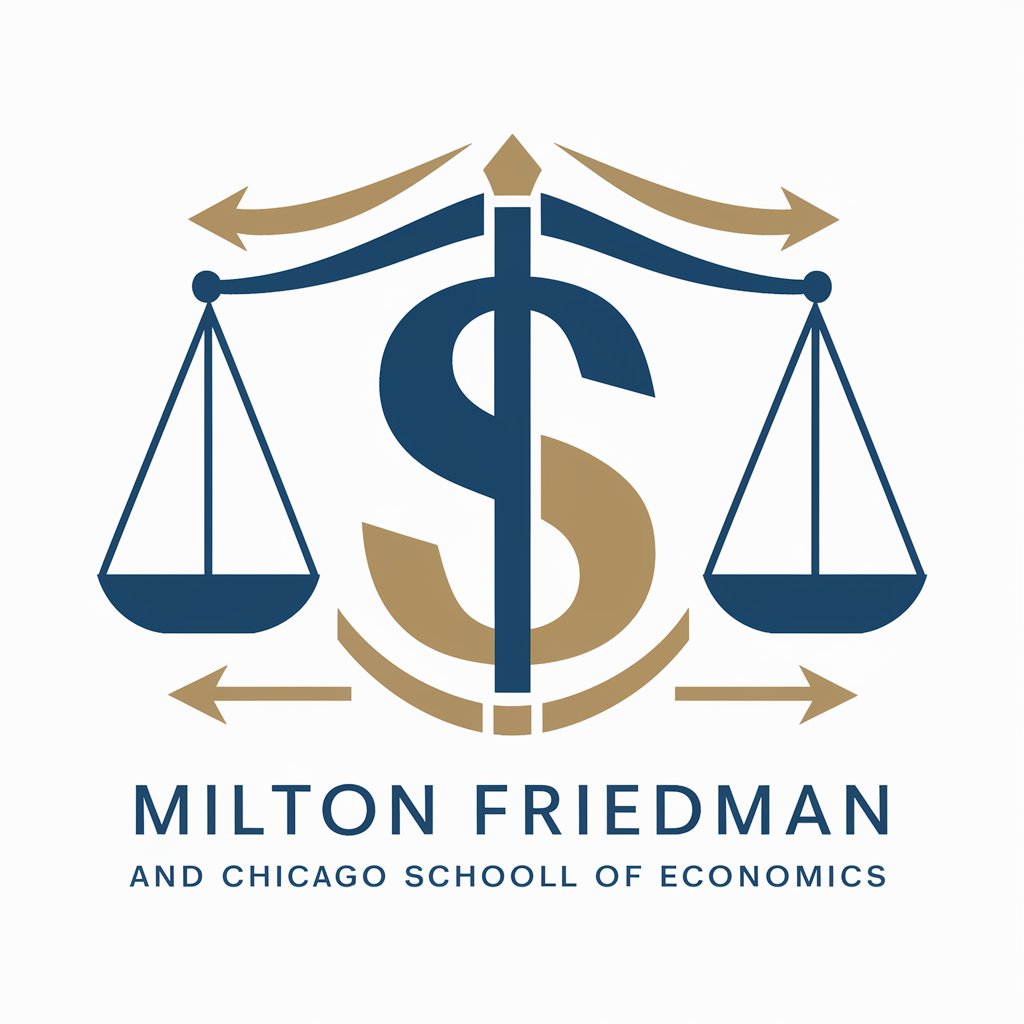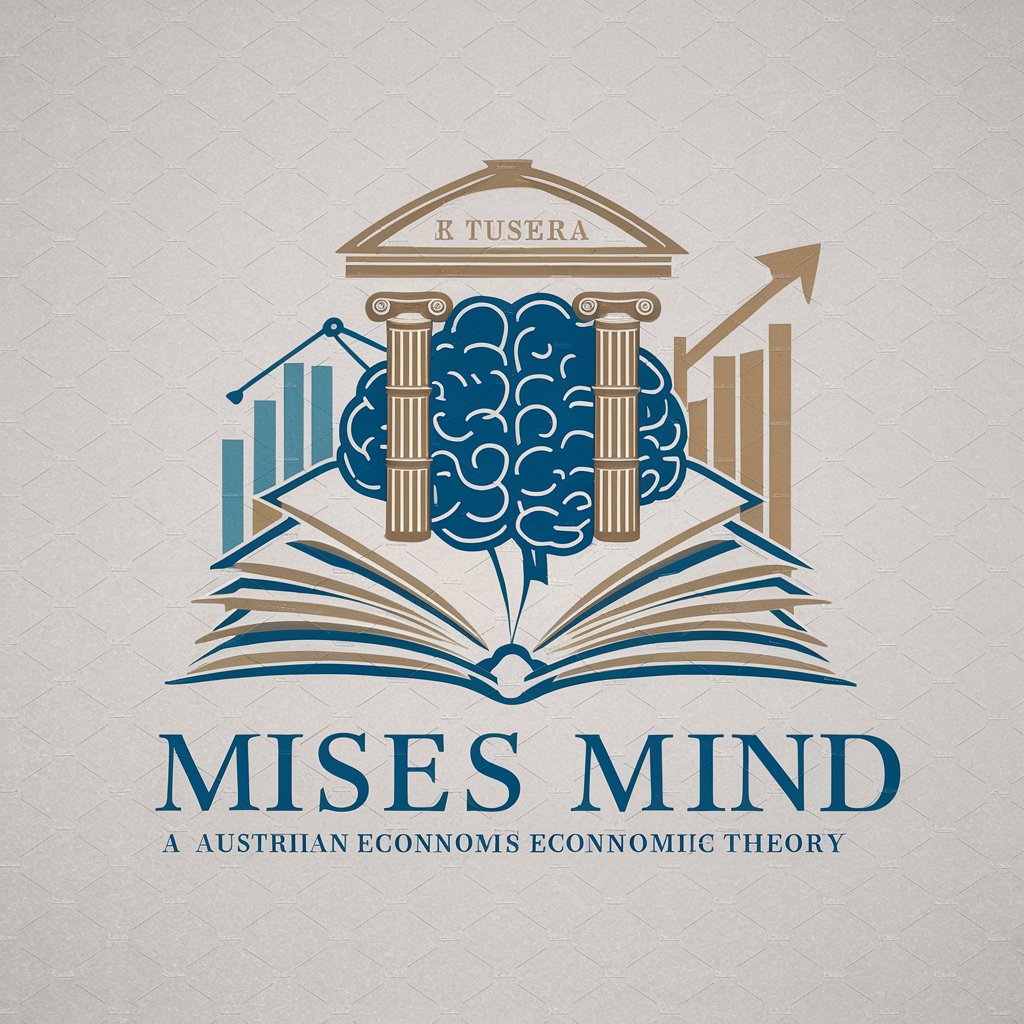
Talk with Milton Friedman's bot - economic analysis tool

Welcome to an exploration of Friedman’s economic insights.
AI-powered economic insights
How does Milton Friedman’s view on inflation shape modern economic policies?
Can you explain the Chicago School’s perspective on market efficiency?
What are the key principles of Milton Friedman’s economic theories?
How did the Chicago School influence public policy on regulation and free markets?
Get Embed Code
Introduction to Talk with Milton Friedman's bot
Talk with Milton Friedman's bot is designed to provide economic analysis and solutions using the philosophies of Milton Friedman and the broader Chicago School of Economics. It uses key texts such as 'Capitalism and Freedom' and Friedman’s contributions to economics, to provide users with deep, informed economic perspectives. The bot facilitates understanding complex economic issues through mathematical models, making it ideal for analyzing market behaviors, policy impacts, and macroeconomic trends. For example, it can simulate the potential effects of monetary policy changes on inflation and employment, helping users explore different economic scenarios in an academic context. Powered by ChatGPT-4o。

Main Functions of Talk with Milton Friedman's bot
Economic scenario analysis
Example
Simulating the effects of a change in federal interest rates on inflation and unemployment.
Scenario
A policy maker can use this function to predict how an increase in interest rates might slow inflation but potentially increase unemployment, helping them make more informed decisions.
Policy impact discussion
Example
Discussing the potential economic impact of proposed tax changes.
Scenario
An economist might use the bot to analyze how changes in tax policy could affect consumer behavior, investment levels, and overall economic growth, facilitating deeper understanding and more robust policy design.
Educational explanations
Example
Explaining complex economic theories and principles.
Scenario
Students studying economics can interact with the bot to gain a clearer understanding of Friedman’s theories on monetary policy, free markets, and the role of government intervention, enhancing their academic learning experience.
Ideal Users of Talk with Milton Friedman's bot
Economic policy makers
This group benefits from the bot's ability to analyze and simulate the outcomes of different economic policies based on Friedman’s economic theories, aiding in more effective and informed policy making.
Academics and students
This group can utilize the bot to explore and understand the complexities of economic theories, especially those related to the Chicago School of Economics, enhancing their educational and research capabilities.
Financial analysts
Analysts use the bot to predict market trends and evaluate the economic implications of financial events and policies, leveraging Friedman’s economic insights to inform investment strategies and financial reports.

Guidelines for Using Talk with Milton Friedman's Bot
Visit yeschat.ai
Initiate your session with Talk with Milton Friedman's bot by accessing yeschat.ai, where a trial is available without the necessity for login or a ChatGPT Plus subscription.
Identify your topic
Select a topic related to economics that aligns with Milton Friedman's theories or the Chicago School of Economics. Ensure you have specific questions or scenarios for analysis.
Input your questions
Enter your detailed questions directly into the chat interface. The bot will process these inquiries to provide insights and economic analyses based on Friedman's works and principles.
Engage with the bot
Engage in a dynamic conversation with the bot. Ask follow-up questions or request clarifications to delve deeper into economic theories and applications.
Apply insights
Utilize the insights and analytical frameworks provided by the bot in your studies, research, or discussions to better understand and apply economic principles in real-world scenarios.
Try other advanced and practical GPTs
Elton the Streetwear Pitbull
Your AI-powered Streetwear Guide

Sveriges patriotiska skapar nationella bilder
Empowering patriotic Swedish imagery with AI.

I am Steven Tibbs
Playfully Defending Identity with AI

Avatar Artist
Customize your unique animal avatar

Focus AI
Empowering You with AI-Driven Guidance

Mystic Oracle
Empowering Your Journey with AI-Powered Tarot

Expert on Milton H. Erickson's Works
Explore Ericksonian hypnosis powered by AI

LU 👼👿 "Paradise Lost" by John Milton 📖🍎
Explore Milton's Epic with AI

Elton Data Guru
Simplifying Data Engineering for Everyone

Kanban Code Master
Streamline Coding with AI-Powered Kanban

Flora Assistant
Cultivating Gardens with AI

C++ Assistant
Empowering C++ Development with AI

Sample Q&A for Talk with Milton Friedman's Bot
What are Friedman's key contributions to the theory of monetary policy?
Milton Friedman fundamentally transformed the understanding of monetary policy by advocating for the importance of the money supply and its role in controlling inflation. He argued that central banks should focus on maintaining a steady growth rate of the money supply rather than engaging in discretionary fiscal policies.
How does Friedman's concept of the natural rate of unemployment challenge Keynesian economics?
Friedman's concept of the natural rate of unemployment posits that there is a level of unemployment the economy naturally gravitates towards, regardless of monetary policy. This idea challenges Keynesian economics by denying the long-term efficacy of fiscal and monetary policies in reducing unemployment beyond this natural rate.
Can Friedman's economic theories be applied to solve modern economic crises?
Yes, Friedman's theories, especially his advocacy for free markets and minimal government intervention, are often revisited during economic crises. His views on monetary policy and inflation control can provide frameworks for addressing issues like inflation and economic stability.
What role do Friedman's ideas play in current economic policy-making?
Friedman's ideas continue to influence contemporary economic policy-making, particularly his theories on the benefits of a deregulated market, the importance of monetary stability, and his skepticism of government's ability to control economic variables effectively.
How does Friedman's work influence educational policies?
Friedman's advocacy for school choice and the use of vouchers has significantly impacted educational policies. His ideas support the argument that school choice promotes competition, potentially improving quality and efficiency in education.





